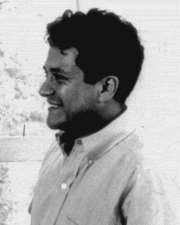|
Биография Carlos Castaneda
Carlos Castaneda (25 December 1925 – 27 April 1998) was a Peruvian-born American anthropologist and author. Starting with The Teachings of Don Juan in 1968, Castaneda wrote a series of books that describe his purported training in traditional Mesoamerican shamanism. His 12 books have sold more than 8 million copies in 17 languages. The books and Castaneda, who rarely spoke in public about his work, have been controversial for many years. Supporters claim the books are either true or at least valuable works of philosophy and descriptions of practices which enable an increased awareness. Academic critics claim the books are works of fiction, citing the books' internal contradictions, discrepancies between the books and anthropological data, alternate sources for Castaneda's detailed knowledge of shamanic practices and lack of corroborating evidence.
In his books, Castaneda narrated in first person what he claimed were his experiences under the tutelage of a Yaqui shaman named don Juan Matus whom he met in 1960. Castaneda wrote that he was identified by don Juan Matus as having the energetic configuration of a "nagual", who, if the spirit chose, could become a leader of a party of seers. He also used the term "nagual" to signify that part of perception which is in the realm of the unknown yet still reachable by man, implying that, for his party of seers, don Juan was in some way a connection to that unknown. Castaneda often referred to this unknown realm as nonordinary reality, which indicated that this realm was indeed a reality, but radically different from the ordinary reality experienced by human beings who are well engaged in everyday activities as part of their social conditioning. Ordinary reality as experienced by humans was simply a "description" that had been pounded into their awareness since they were infants.
Immigration records for Carlos Cesar Arana Castaneda indicate that he was born on 25 December 1925 in Cajamarca, Perú. Records show that his surname was given by his mother Susana Castañeda Navoa. His father was Cesar Arana Burungaray. His surname appears with the ñ in many Hispanic dictionaries, even though his famous published works display an anglicised version. He moved to the United States in the early 1950s and became a naturalized citizen in 1957. In 1960 he was married to Margaret Runyan in Tijuana, Mexico. They lived together for only six months, but their divorce was not finalized until 1973. He was educated at the University of California, Los Angeles (UCLA) (B.A. 1962; Ph.D. 1973).
Castaneda’s first three books, The Teachings of Don Juan: A Yaqui Way of Knowledge, A Separate Reality and Journey to Ixtlan, were written while Castaneda was an anthropology student at UCLA. He wrote these books as his research log describing his apprenticeship with a traditional "Man of Knowledge" identified as don Juan Matus, a Yaqui Indian from northern Mexico. Castaneda was awarded his bachelor's and doctoral degrees based on the work described in these books.
In March 1973 Castaneda was the subject of a cover article in Time cover article 5 March 1973 (Vol. 101 No. 10). The article described him as "an enigma wrapped in a mystery." Following that interview until the 1990s Castaneda disappeared from public view.
In 1974 his fourth book, Tales of Power, was published. This book ended with Castaneda leaping from a cliff into an abyss, and signaled the end of his apprenticeship under the tutelage of don Juan. Castaneda continued to be popular with the reading public with subsequent publications. In all twelve books by Castaneda were published, two of them posthumously.
In the 1990s Castaneda once again began appearing in public to promote Tensegrity, a group of movements that had been passed down by 25 generations of Toltec shamans. On June 16, 1995 articles of incorporation executed by George Short were filed to create Cleargreen Incorporated. The Cleargreen statement of purpose says in part, "Cleargreen is a corporation that has a twofold purpose. First, it sponsors and organizes seminars and workshops on Carlos Castaneda's Tensegrity, and second, it is a publishing house." Cleargreen published three videos of Tensegrity movements while Castaneda was alive. Castaneda himself did not appear in these videos.
Castaneda died on 27 April 1998 in Los Angeles due to complications from hepatocellular cancer. There was no public service, Castaneda was cremated and the ashes were sent to Mexico. It wasn't until nearly two months later, on June 19, 1998, that an obituary entitled A Hushed Death for Mystic Author Carlos Castaneda by staff writer J.R. Moehringer appeared in the Los Angeles Times.
Four months after Castaneda's death C. J. Castaneda, also known as Adrian Vashon, whose birth certificate claims Carlos Castaneda as his father, challenged Castaneda's will in probate court. For many years Castaneda had referred to Vashon as his son. The will was signed four days before Castaneda's death and Vashon challenged its authenticity. The challenge was ultimately unsuccessful.
|





